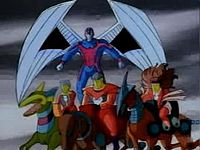- Come the Apocalypse
-
"Come the Apocalypse" 'X-Men: The Animated Series' episode 
The Horsemen are sent by Apocalypse to destroy the world.Episode no. Season 1
Episode 10Written by Michael Edens Production code 110 Original air date February 27, 1993 Episode chronology ← Previous
"The Cure"Next →
"Days of Future Past"List of X-Men 1992 TV Series Episodes Come the Apocalypse is an episode in the animated TV series X-Men Animated Series. This episode is loosely based on X-Factor #24.[1]
Characters
X-Men: Professor X, Cyclops, Wolverine, Storm, Rogue, Gambit, Jean Grey, Jubilee
Supporting characters: Moira MacTaggert, "Dr. Adler"
Villains: Apocalypse, Archangel, War, Famine, Pestilence, Mystique
Cameos: none
Synopsis
In Dr. Adler's laboratory, the doctor straps Warren Worthington III into his machine and prepares him for the cure treatment. As the machine lights up, Dr. Adler reverts back to Mystique and cackles as Warren screams in agony. Apocalypse appears and congratulates Mystique on finding such a great mutant to be his slave. Meanwhile, mutants on Muir Island are in an uproar about waiting for Dr. Adler's cure, desperately wanting to be normal. Professor X, Cyclops, Jean Grey, and Rogue watch as two mutants playing darts, a young man named Abraham Kieros and an old woman (Plague, one of the Morlocks seen in "Captive Hearts"), bicker about the cure. Other mutants, such as a young, anorexic girl named Autumn Rolfson, are beating themselves up inside. Suddenly, Warren walks in and explains that the cure really does work.
Apocalypse, meanwhile, has already turned Warren into the Horseman of Death. Abraham, Plague, and Autumn all take the treatment, and become War, Pestilence, and Famine respectively. The X-Men, playing billiards, notice a peace conference when Apocalypse and his Horsemen attack. They destroy everything, tearing Paris apart and killing numerous people. Xavier tells the X-Men that this is something he has feared for some time; an incredibly powerful mutant whose very abilities have driven him compleatly mad. Professor X expresses his concern to the X-Men and send them to stop Apocalypse. He sends Rogue, however, back to Muir Island to talk to Dr. Adler.
All across the globe, the Horsemen lay waste to the area around them. Famine attacks the crop fields of England, War attacks a military base, and Death destroys a dam. Rogue finds Dr. Adler and discovers that Dr. Adler is really Mystique, who spills her guts about Apocalypse's plans. She then shoots Rogue in the back and destroys the machine, so that the Horsemen could never be returned to their normal selves. Pestilence is causing a commotion elsewhere, attacking several soldiers and killing them with her plagues. The X-Men appear and battle her, able to knock her off her horse. The other Horsemen appear, battling the X-Men. Wolverine is able to damage War's horse, but not without being dropped from the sky. The Horsemen flee after being overwhelmed, and report back to Apocalypse in Stonehenge.
Rogue finds Apocalypse and is nearly killed by his blasts. The X-Men arrive just in time to save Rogue and battle the Horsemen once more. Famine battles Storm, while Pestilence is easily defeated by Jean Grey. Rogue eventually grabs Archangel and absorbs his memory, sucking Apocalypse's power out of him. Archangel, appalled at what he has become, blasts the other Horsemen away. Apocalypse flees in a spaceship, and the diversion allows the other Horsemen to escape also. Rogue cowers in the corner, but Archangel helps her. Filled with guilt, Archangel flies off.
References
- ^ X-Factor #24
- X-Men - Apocalypse [VHS]. Buena Vista Home Entertainment.
X-Men in other media Films TV Pryde of the X-Men • X-Men: The Animated Series (characters • episodes • X-Men Cartoon Maker) • Spider-Man: The Animated Series • Generation X • X-Men: Evolution (characters • episodes) • Wolverine and the X-Men (episodes) • The Super Hero Squad Show • Marvel Anime
TV charactersVideo games X-MenQuestprobe Featuring the X-Men (1985, cancelled) · The Uncanny X-Men (1989) · Madness in Murderworld (1989) · The Fall of the Mutants (1990) · X-Men (1992) · Arcade's Revenge (1992) · X-Men (1993) · Mutant Apocalypse (1994) · Children of the Atom (1994) · Game Master's Legacy (1994) · X-Men (1994) · Clone Wars (1995) · X-Men vs. Street Fighter (1996) · Mojo World (1996) · The Ravages of Apocalypse (1997) · Mutant Academy (2000) · Mutant Wars (2000) · Mutant Academy 2 (2001) · Reign of Apocalypse (2001) · Next Dimension (2002) · X-Men Legends (2004) · Rise of Apocalypse (2005) · The Official Game (2006) · X-Men: Destiny (2011)WolverineWolverine (1991) · Adamantium Rage (1994) · War of the Gems (1996) · Wolverine's Rage (2001) · Wolverine's Revenge (2003) · X-Men Origins: Wolverine (2009)OtherMarvel Super Heroes (1995) · Marvel Super Heroes vs. Street Fighter (1997) · Marvel vs. Capcom: Clash of Super Heroes (1998) · Marvel vs. Capcom 2: New Age of Heroes (2000) · Marvel Nemesis: Rise of the Imperfects (2005) · Marvel: Ultimate Alliance (2006) · Marvel: Ultimate Alliance 2 (2009) · Marvel Super Hero Squad (2009) · Marvel Super Hero Squad: The Infinity Gauntlet (2010) · Marvel vs. Capcom 3: Fate of Two Worlds (2011)X-Men characters in
other media articlesApocalypse • Beast • Colossus • Cyclops • Gambit • Phoenix • Magneto • Mystique • Nightcrawler • Professor X • Rogue • Storm • WolverineSee also: X-Men · X-Men storylines · X-Men comics Marvel Animated Universe Television series X-Men (1992) · The Marvel Action Hour (Iron Man (1994) · Fantastic Four (1994)) · Spider-Man (1994) · The Incredible Hulk (1996) · Silver Surfer (1998) · Spider-Man Unlimited (1999) · The Avengers: United They Stand (1999)Lists of episodes X-Men (releases) · Iron Man · Fantastic Four · Spider-Man · The Incredible Hulk · Silver Surfer · Spider-Man Unlimited · The Avengers: United They StandCharacters Spider-Man · X-MenMerchandise Related articles Categories:- X-Men (TV series) episodes
- 1993 television episodes
Wikimedia Foundation. 2010.
